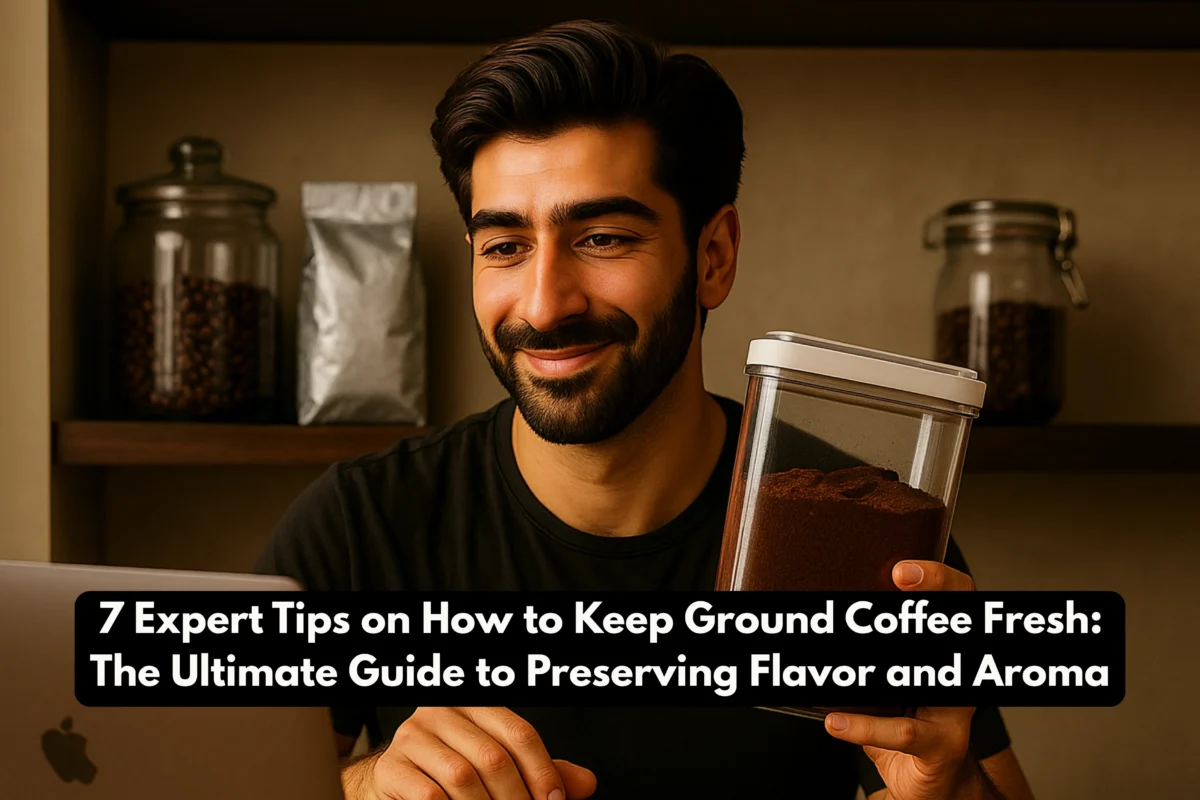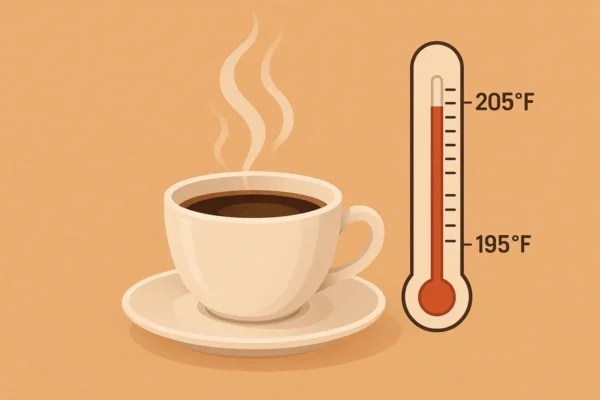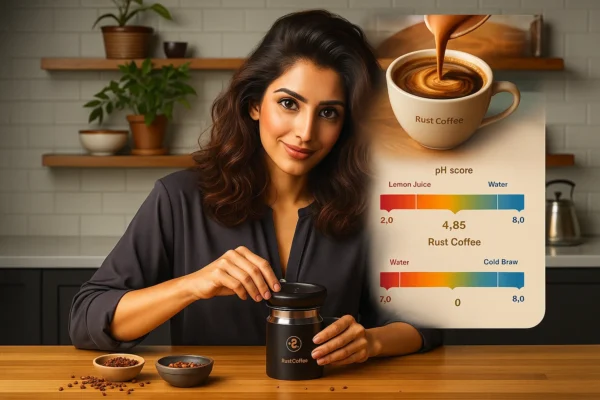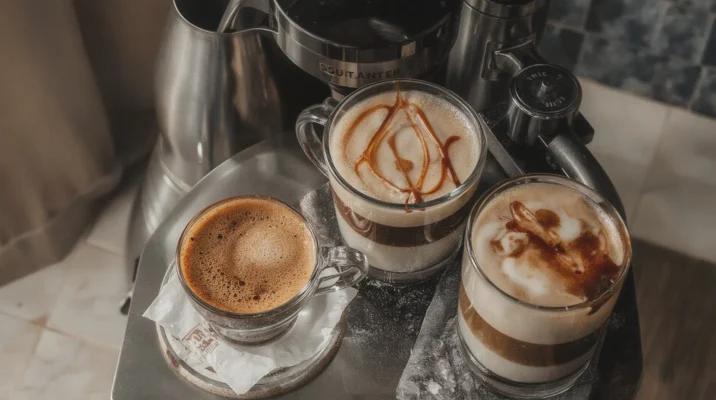How to Keep Ground Coffee Fresh: Introduction
- Issue: Ah, the moment you open your fresh package of freshly ground coffee and the smoky, fragrant aroma fills the air, there’s no other experience quite like it. However, soon it’s gone, which leaves you with a dull, boring drink. If you’ve ever been in the middle of a table and wondered why freshly ground coffee doesn’t smell as fresh as it did after a couple of days, then you’re not alone. It’s a major annoyance.
- Agitation: I get it. You’ve probably tried everything from placing your coffee in the refrigerator, freezer, or simply keeping it in a bag. However, every time you try the coffee, it comes out empty, lacking that powerful kick you’ve always wanted. In all honesty, all the tricks that are floating around don’t help you much, do they?
- Solution & Promise: Don’t worry. I’ve spent years mastering my technique in roasting beans and trying out the best storage methods. This is the key: ensuring that your coffee is fresh isn’t a matter of magic, only the right understanding and tools. At the end of this article, you’ll know what you can do to keep your cup in order to keep its taste, and you’ll not waste coffee ever again. I’m sure you’ll agree that it’s time to revamp your regular coffee-making routine.
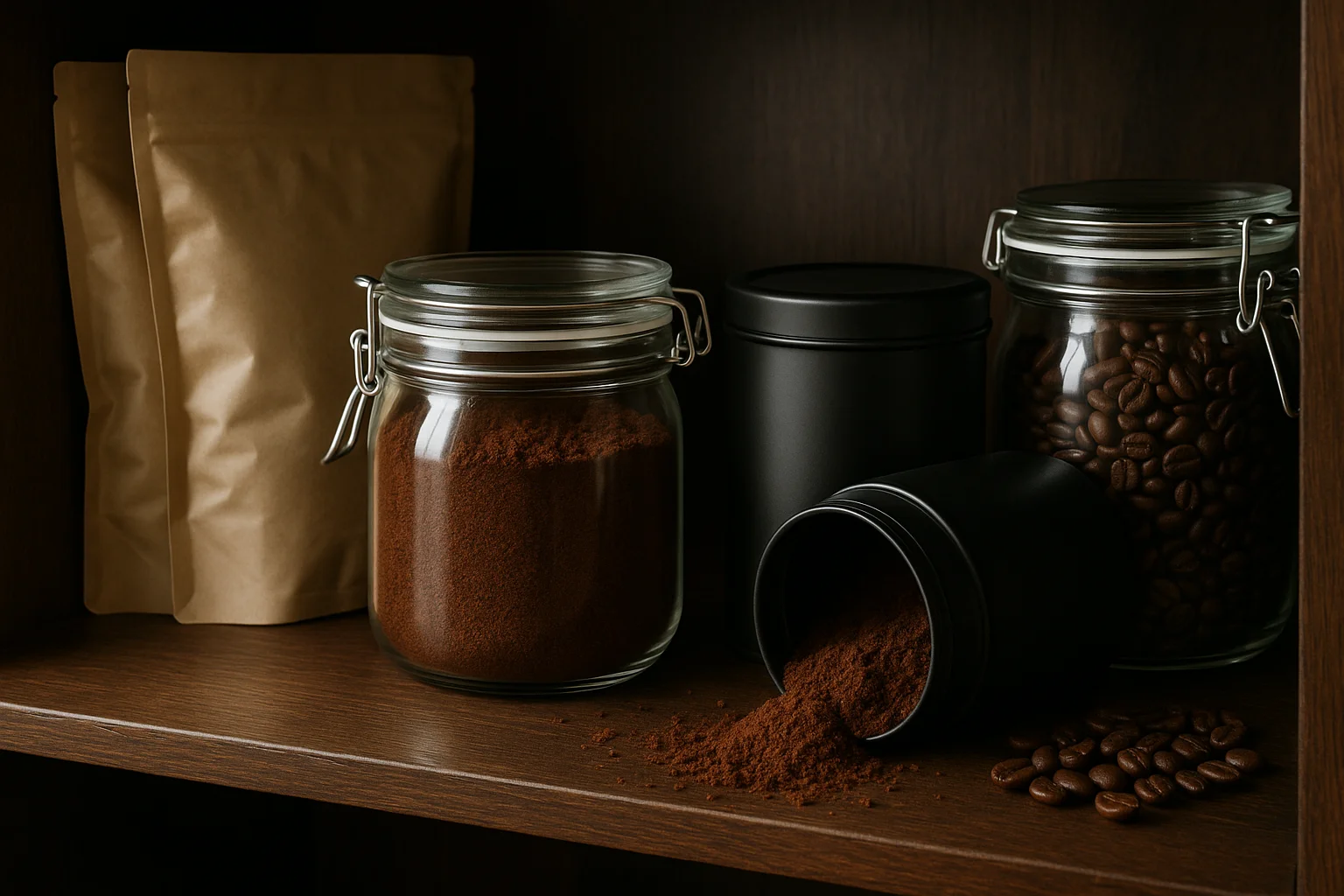
The Science of Ground Coffee Freshness: What Really Happens When Coffee Goes Stale (and How to Stop It)
Okay, let’s discuss something I’ve learned quite perfectly: How to keep coffee grounds fresh. As a roaster who’s spent more than 15 years mastering how to roast and make, I’ve discovered a few things about what causes coffee to go old, and it’s certainly not only about the quality or the bean. You could possess the best beans in the world, but if you don’t keep them in the right way, the beans will lose their flavor quickly. Believe me, I’ve been there.
So let’s get into the research behind this. If you’re looking forward to enjoying each time you drink a cup of fresh coffee, the first step is to understand what you can do to ensure that your ground coffee remains fresh.
The Four Enemies of Fresh Ground Coffee (and How They Attack Flavor):
1. Air (Oxidation):
This is the first of the villains: Air. As soon as you open that package of ground coffee, the air begins to break down the oils and components that give your coffee its rich taste. This is the reason why your coffee starts becoming bland after a couple of days. However, the good news is that you have the ability to combat it. Airtight containers are your most reliable companion in this case. Protect your coffee from oxygen and retain that rich aroma and a strong taste for a long time. Simple, right? If you’re interested in knowing what you can do to ensure that your freshly ground coffee starts fresh, seal off the atmosphere.
2. Light (UV Degradation):
Let’s talk about light for at least a second. It’s not only to make your cup look beautiful, but it actually deteriorates the taste of your coffee. UV light, specifically causes the breakdown of the substances in the coffee, leaving it with an unpleasant taste. It’s as if you let your coffee be exposed to the sun for all day long. Not good! Place the coffee inside the form of a clear container. Make sure to keep it in the dark away from light, which slowly degrades the coffee’s taste. How do you keep your fresh coffee grounds? Protect it from sunlight.
3. Heat:
Here’s a sneaky alternative: the heat. The heat speeds up every bad thing, which includes the degradation of coffee. If you keep your coffee close to a heat source like an oven or on a counter that is sunny in the kitchen, you’re essentially looking for old coffee.
The temperature causes the oils within the beans to degrade faster, depriving you of the fresh, rich taste. Keep your coffee in an air-conditioned, dry area. There is no need to be fancy; put your coffee in the refrigerator away from the heat. How do you keep your fresh ground coffee? Maintain it at a cool temperature.
4. Moisture:
Moisture is now an enormous problem. In the event that the ground coffee is exposed to water, it begins to dissolve all the great flavors. It may even cause mold. Let’s be real, you do not want that to happen in your coffee.
Be sure that the containers you use have been kept dry and free of moisture. Whatever you decide to do, make sure that you don’t put your coffee in the bathroom or somewhere wet. How to Keep Ground Coffee Fresh? Be sure to keep it dry, my dear friend.
How do These Enemies Attack Freshness?
What’s happening when your coffee gets old? It’s a combination of these four enemies: light, air, moisture, and heat, which destroy the aroma and flavor. Once you know these aspects and take the necessary steps to guard your coffee.
The most important thing to do to keep your coffee fresh is to keep it in an airtight, cool, dark, and dry location. This is the recipe for keeping the aroma and flavor, so that you can enjoy your coffee as fresh as it was the day you purchased it.
The Fundamental Rules for Storing Ground Coffee
Let me explain it to you: This is the place where magic occurs. There is no need for an expensive lab, but some discipline and these essential rules to store your coffee:
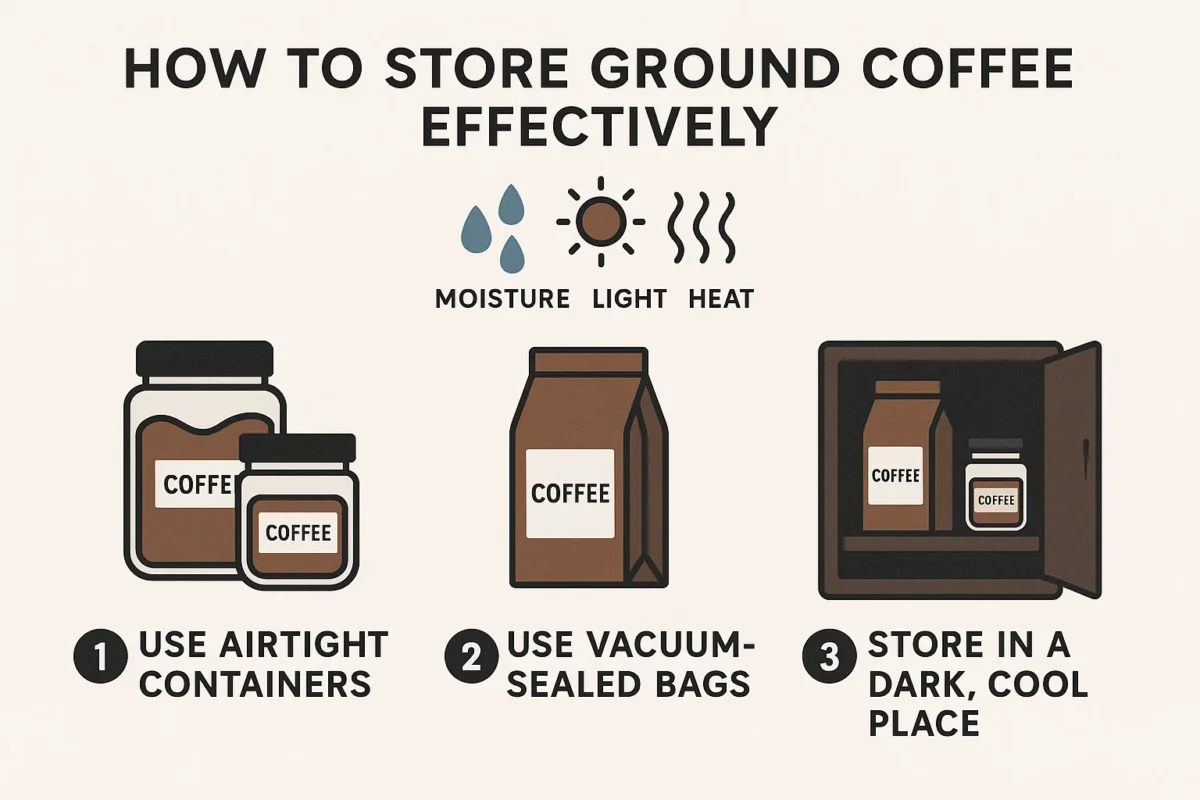
- Airtight: Secure that cup of coffee inside. Oxygen is the enemy.
- Opaque: It is said that light can be one coffee’s most formidable enemies. You must ensure that it is kept in the dark.
- Super Cool: Make sure to keep your coffee stored in an air-conditioned, dry area. No heat! Heat speeds up degradation.
- Dry: The presence of moisture can ruin your coffee. Be assured that your coffee isn’t going to be able to become a fertile soil for mold.
A Great Debate: Fridge Vs. Freezer for Ground Coffee
Fridge Storage – A Misconception:
Let’s get to the biggest issue, which is the fridge. The common belief is, “Put it in the refrigerator, and it’ll keep in good condition! “But that’s just a myth.
A fridge is a damp atmosphere, and your coffee will absorb the smells from the kitchen. Additionally, each time you open the door, you let moisture in. It’s like putting your coffee in a smelly, damp cave.
Freezer Storage – When to Use It:
The process of freezing coffee is more difficult. It is possible to freeze unopened vacuum-sealed bags of coffee in order to preserve the freshness of your coffee for an extended period of time.
Once the bag is opened, you shouldn’t even consider throwing it into the freezer. The fluctuations in temperature can cause condensation, which is an easy way to spoil your coffee. It’s unwise, and do not ever freeze and then thaw it more than once.
Buyer’s Guide: Expert Tips on How to Keep Ground Coffee Fresh (Containers & Accessories)
When it comes to keeping your coffee grounds fresh, the container you select is equally crucial as the coffee itself. It doesn’t matter if you’re storing small amounts at home or handling massive exports; the best storage system will make a huge difference.
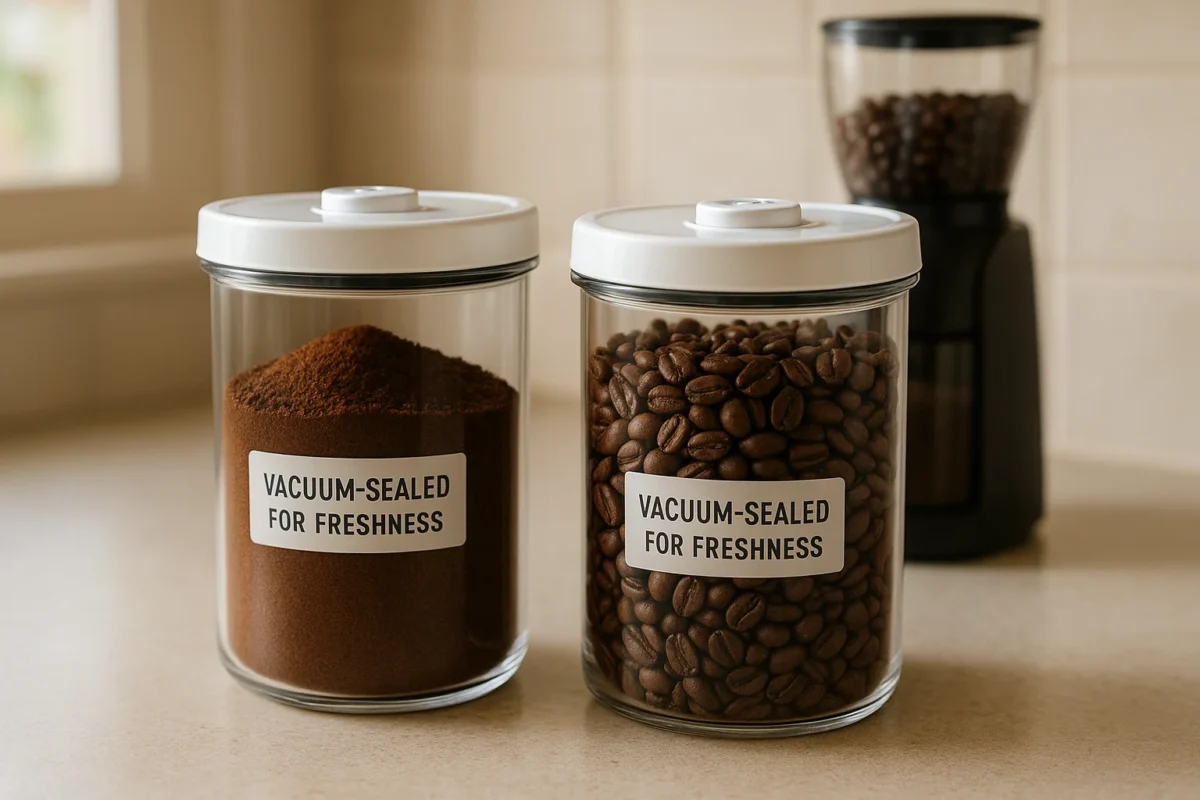
Let’s look at the best ways to store your coffee beans to keep that fresh taste. We’ll also provide suggestions designed explicitly for you to buy coffee beans in huge quantities. We’ve got you covered.
Choosing the Right Container:
Vacuum-Sealed Canisters:
They are the gold standard for keeping your coffee fresh. Vacuum-sealed containers eliminate air from your coffee, ensuring that the aroma and flavor remain in place for longer. No air, no problem. I’ve tried these myself and found nothing more effective than the quality of a vacuum seal for freshness.
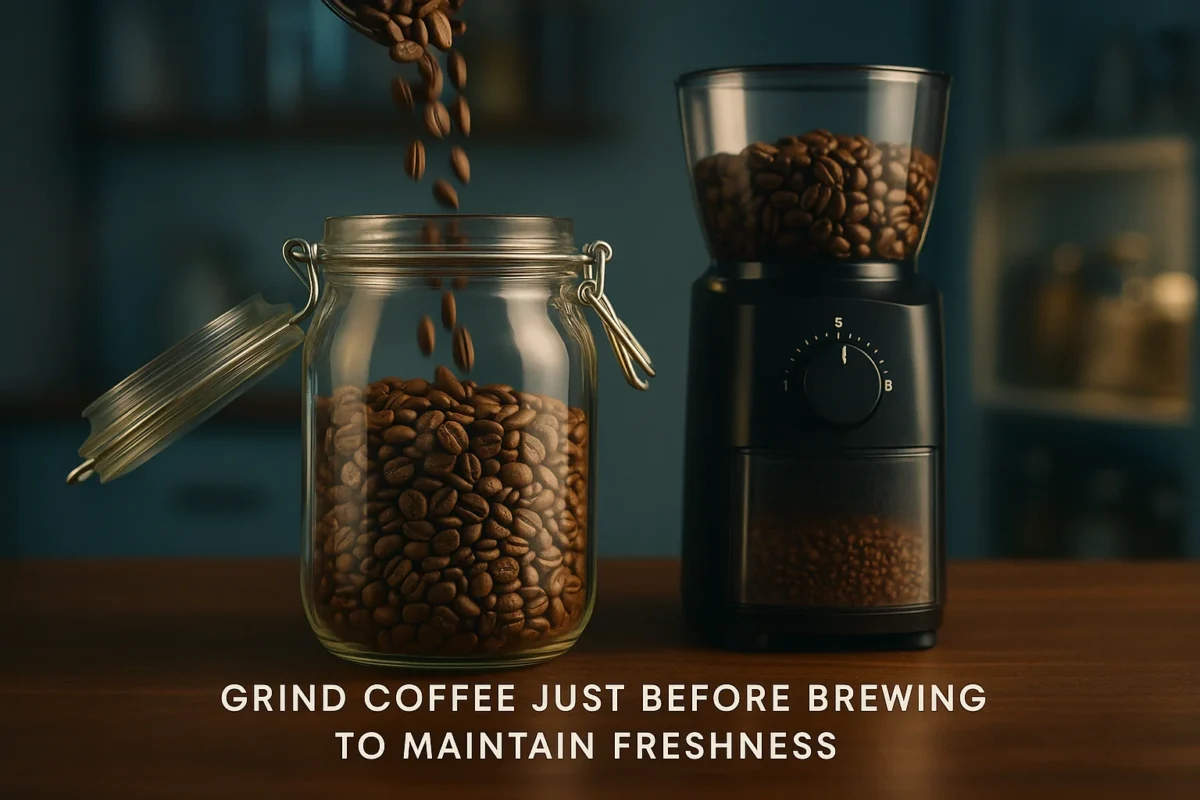
If you’re passionate about your coffee and would like to preserve the taste, it’s essential for your kitchen, or even for small quantities.
Opaque, Airtight Containers:
If you don’t like vacuum sealing, do not fret. Choose opaque, airtight cups, and they work just as well! Opaque ensures that no light can enter and ruin the coffee, and airtight locks in that taste. Containers made from metal and ceramic are ideal.
They don’t have to look elegant, but they’ll help ensure your coffee is safe from light and air, and allow you to enjoy that fresh flavor for longer.
Food-Grade Silicone-Sealed Containers:
Are you always on the move? Are you always on the move? Sealed silicone containers are ideal for those who require something that is portable and durable. They’re lightweight, durable, and simple to carry around. If you’re on the move or need a container that doesn’t take up a lot of space, these containers are perfect to keep your coffee fresh when you’re on the go.
Essential Accessories for How to Keep Ground Coffee Fresh and Avoid Stale-Tasting Brews – Perfect for Coffee Lovers and Importers
Let’s discuss accessories. They’re a little more sophisticated, but if you are importing coffee in large quantities or have a larger amount of coffee, these accessories can aid in keeping that fresh quality coffee, regardless of bag size.
Hygrometer:
For coffee importers handling 40-60 kg bags of beans, a digital hygrometer is your best friend. Moisture is among the main problems affecting the freshness of your coffee, particularly when handling huge amounts. A hygrometer lets you keep track of the humidity within your storage area and ensure the best conditions to keep your coffee fresh.
A lot of moisture can cause spoilage, mold, and a loss of flavor. If you’re storing your beans in a roastery, warehouse, or a simple storage space, you must manage humidity. Moisture. A hygrometer will give you instant measurements to stop excessive moisture from destroying the bulk coffee. This is vital in the case of exporters who wish to keep their coffee correctly in the long run.
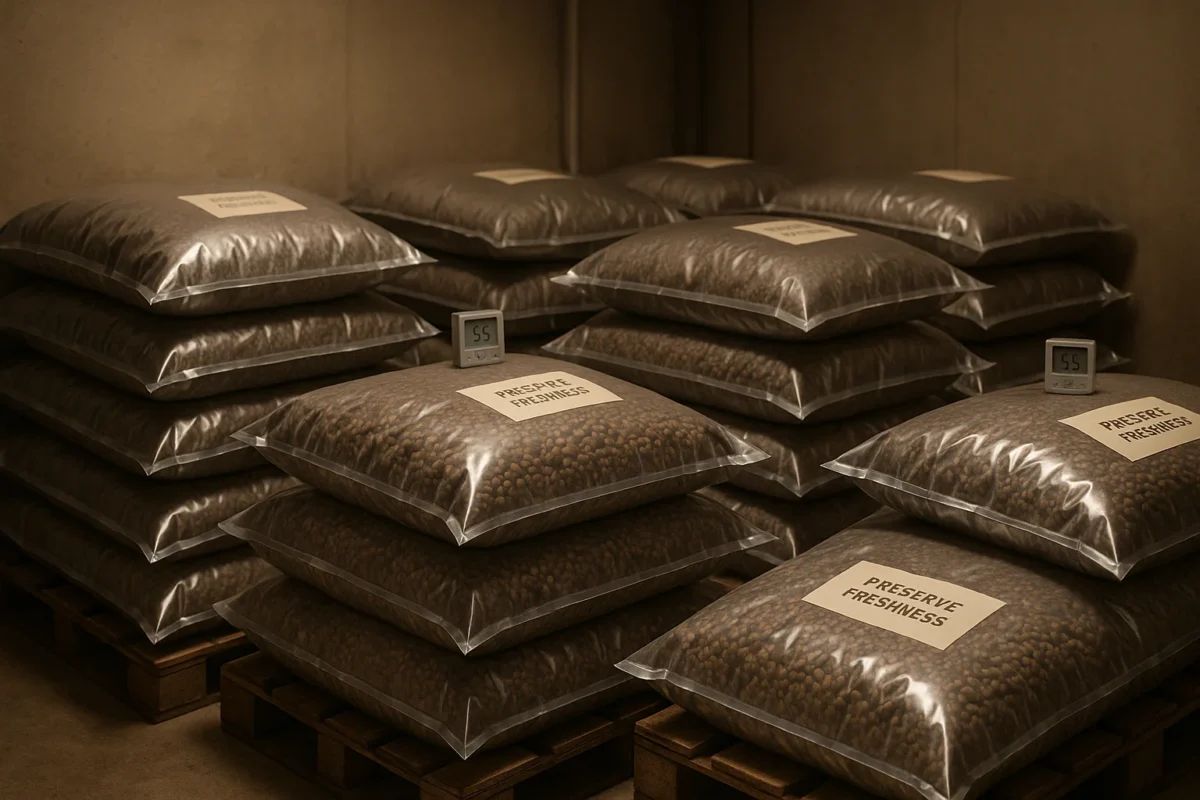
Miniature Vacuum Sealers:
If you are purchasing coffee beans in large quantities for bulk purchases, the small vacuum sealer is an indispensable tool. It allows you to reduce those huge 40-60kg bags down into more compact, more manageable portions. If you’re keeping large amounts of coffee in one go, sealing everything correctly can be a problem, particularly with bags that are open and exposed to air.
Utilizing the vacuum sealer, it is possible to isolate portions of coffee to preserve their freshness without worrying about moisture and air entering. This can be a game changer for Wholesalers, roasters, and importers seeking to keep their bulk coffees for longer time periods. It also reduces wasted coffee because it lets you just keep what’s needed in the present.
Ideal Storage Space for Coffee Importers:
If you’re dealing with massive amounts of coffee and other coffee, the storage area is as crucial in the same way as the containers. Here’s the information you must be aware of:
- Cool Dry Place Coffee, particularly when it is stored in large quantities, requires a cooler, dry place. The heat accelerates the breakdown of coffee’s essential oils, while moisture could cause spoilage and mold. Keep your beans in a room that is consistent in temperature and moisture levels. If you’re dealing with large quantities of imports, be sure that your storage space isn’t close to stoves, windows, or any other source of heat.
- Abstain from Light. The light, particularly UV rays, is detrimental to the freshness of coffee. A dark storage area is essential to prevent the cup from losing its taste. If you’re storing bags of 40 kilograms or smaller pieces, no direct light is allowed to reach the coffee.
- Ventilation Proper ventilation is essential. Airflow aids in maintaining the correct level of moisture to prevent the accumulation of humidity within the storage space. A room with good ventilation can help you keep your coffee beans in bulk within the best possible environment. If you’re keeping coffee for a long time, investing in a storage that is climate-controlled is a smart choice.
Practical Tips for Maximizing Daily Freshness
- Buy smaller batches of coffee: I always tell people to purchase coffee in batches that will be finished within 1-2 weeks. This reduces the exposure to the elements and keeps the freshness of your coffee.
- Grind just prior to brewing: If you want to taste the full flavor in your beverage, make sure you grind it before you start brewing. The aromas and oils are at their best after grinding.
- Dry Scoops Use a totally dry scoop to avoid the introduction of moisture. The slightest amount of moisture could ruin your coffee before it can be brewed.
- Make sure you invest in quality containers: You don’t need to overspend; however, a well-built transparent, airtight container can make a huge difference.
Signs Your Ground Coffee Has Gone Stale (and What to Do with It)
How do you know when your coffee is ruined? The indicators are fairly evident:
- Insufficient Aroma: If it doesn’t smell fresh upon opening it, then it’s probably been stale for a while.
- Flat, Cardboard Taste If it smells like it’s been in storage for a while, it most likely has.
- No Blooming During Brewing: If your coffee does not bloom (that lovely bubbling sensation that occurs when hot water touches the grounds), is it not fresh?
Rescue Slightly Stale Coffee:
If your coffee is a bit flat, do not throw it away at this point. Please make use of it in baking (coffee cakes are delicious!), and gardening (coffee grounds are an excellent fertilizer), and even for a homemade face scrub. Don’t waste, don’t want.
Conclusion: Enjoy Better Coffee, Every Time
The key to making a great cup begins with proper storage. Beware of the enemies of freshness: air, light, heat, and moisture. You’ll end up making the best cup every single time. It’s time to adopt these strategies, eliminate loss, and ensure that your coffee is fresher than the day it was purchased.
So, get your cup and store your coffee in the right place, and let us keep those smoky aromas and full-bodied tastes in every cup.
How to Keep Ground Coffee Fresh? FAQ’s
What is the best time for ground coffee to keep it in good condition?
The freshest coffee is available after two weeks of roasting. If you store it correctly within an airtight container in a cold, dry location, it can keep its shelf life for 3-4 weeks. For the best flavor, please stay clear of placing it in direct contact with heat or humidity, or near any light. For the best results, you should consider grinding only the ingredients you’ll need prior to brewing.
Which is the best way to store ground coffee, without a freezer or refrigerator?
The primary factor in ensuring the freshness of coffee is to store it inside a sealed, airtight container free of sunlight, moisture, and temperature extremes. It is a closed container with a one-way valve that lets CO2 escape without letting air in. Storing your coffee in the dimly lit pantry or in a cupboard is ideal, as it ensures that it is dry and cool. Avoid keeping it in the refrigerator as it may absorb odors as well as moisture.
Do you think coffee can go bad?
Coffee can expire if it is not stored correctly. The ground coffee can become more susceptible to being stale and generally starts to go through a loss of freshness in the days or weeks after it is opened. Although stale coffee is still acceptable to drink, its taste will be bland. Be sure to check for growths, mold, or discoloration, and if there is any doubt, throw it out.
Should I store coffee beans or grind coffee?
Ground coffee lasts longer than whole coffee since they have smaller areas of surface exposed to oxygen. Whole beans will stay fresh for four weeks when stored correctly. If you are looking for the freshest cups, grind your beans before you start making your coffee. Coffee that is ground begins losing its flavor shortly after grinding because of the process of oxidation.
What can I tell when my ground coffee has been out of date?
If your ground coffee is exhibiting a damp or aged scent or is dry and bitter, it’s probably lost its flavor. Fresh coffee is supposed to be characterized by a strong aroma and a lively flavor. If it does not bloom (bubble upwards) after pouring water over it, this is another indication that the coffee is old. Make sure to keep the coffee you purchase within sealed containers to preserve the quality and freshness.
Do I have the option of freezing ground coffee in order to keep it fresher longer?
You can store ground coffee that has not been opened within an airtight container to keep its freshness up to one year. Once the container is opened, eit isn’t advised in the case of ground coffee since it can cause condensation when it is thawed and can negatively affect the flavor. If you have to chill coffee, use smaller portions and don’t refreeze it.
Do coffees stored in the refrigerator keep it fresh?u003c/strongu003e
The idea of storing coffee in the refrigerator is not the ideal way to store coffee. Although it might appear like a good option to maintain freshness, moisture, and odors from other food items could affect the taste. It is best to store your coffee inside an airtight transparent container within a cool, dry, dark location such as an open cupboard or pantry.
Are vacuum-sealed bags suitable to store my coffee?
Yes! Vacuum-sealed bags are an excellent alternative in longer-term storage. They aid in eliminating any air and ensure freshness while keeping the coffee’s aroma and flavor in good condition. If you purchase coffee in bulk or wish to keep it in storage for a longer time period, vacuum-sealing is the best option for keeping the quality of your coffee.
What is the best time to keep bean coffees in my freezer?
The whole coffee bean can be kept within the freezer up to 1 month in a sealed, dry, airtight container. Be sure to separate the coffee into smaller pieces to prevent repeated freezing. After it has thawed, allow it to reach room temperature before opening the container. Please make use of it within a week to get the best taste.
What is the best storage container for coffee?
The most effective containers to store ground coffee are airtight and moisture-resistant. The glass or ceramic containers work best as they don’t impact the taste of coffee, whereas stainless steel is tough and shields from light and air. Pick a container that meets your needs for coffee and ensure that the container is sealed correctly to guard against the elements.

